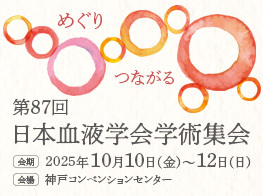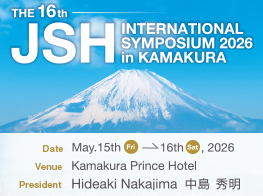名前:石垣 知寛【東京大学医科学研究所幹細胞治療分野】
発表日時:2017年6月23-24日
発表形式:eポスター
Title:
Successful identification of specific amino acid-dependence in adult T-cell leukemia / lymphoma (ATL)
Authors:
Tomohiro Ishigaki1,2, Satoshi Yamazaki3, Yuki Taya1, Kaoru Uchimaru4, Arinobu Tojo2,5, Hiromitsu Nakauchi1,6
Affiliations:
1. Division of Stem Cell Therapy, The Institute of Medical Science, The University of Tokyo, Japan
2. Department of Laboratory Medicine, Research Hospital, The Institute of Medical Science, The University of Tokyo, Japan
3. Project Division of Advanced Regenerative Medicine, The Institute of Medical Science, The University of Tokyo, Japan
4. Laboratory of Tumor Cell Biology, The University of Tokyo, Japan
5. Department of Hematology and Oncology, Research Hospital, The Institute of Medical Science, The University of Tokyo, Japan
6. Institute for Stem Cell Biology and Regenerative Medicine, Stanford University, USA
Abstract:
Background: Adult T-cell leukemia / lymphoma (ATL) is highly aggressive malignancy caused by human T-cell leukemia virus type 1 (HTLV-1). As leukemia / lymphoma cells are often resistant to combination chemotherapy and recent antibody therapy, new strategies should be developed. Our laboratory recently found that proliferation and survival of hematopoietic stem cells are critically dependent on the amino acid valine (Science, 2016).
Aims: We here aimed to assess amino acid-dependence of lymphoma and leukemic stem cells, and tried to establish a novel therapy by utilizing the differences in amino acid-dependence between normal and leukemic stem cells.
Methods: First, primary ATL cells were sorted from samples of 7 typical acute-type ATL patients by 12-color flow cytometry, and serially passaged on stromal cells. Then passageable ATL cells from 3 patients were transduced with GFP-expressing lentivirus for tracking and counting by image cytometry. Using complete medium and twenty different culture media each lacking a single amino acid, we examined amino acid dependency of ATL cells. Amino acids vital for ATL cells were screened by co-culture with stromal cells. Effects of these media on normal lymphocytes of healthy volunteers were also examined. Finally, the effectiveness of amino acid restriction was evaluated in vivo by xeno-transplantation of ATL cells into NOG mice. Mice were fed with different diets lacking specific amino acids at 6 weeks after transplantation, and sacrificed at 10 weeks for analysis of peripheral blood, organs, and lymphoma size.
Results: In-vitro studies revealed that ATL cells have dependency on specific amino acids: cysteine, methionine, and valine. As 2- weeks restriction of the former two amino acids damaged stromal cells or normal lymphocytes, valine was picked up for further analysis. Proliferation of ATL cells was dramatically inhibited by valine restriction while the influence on normal cells was limited. Interestingly, valine restriction did not effect a significant change in the proportion of normal CD4+ populations, such as Treg, naïve, central memory, effector memory, and effector T-cells. Moreover, 4-week restriction of valine succeeded in eradicating ATL cells in vitro and no recurrence was observed after refilling valine although 2-weeks restriction was insufficient for extermination. In-vivo model also showed that 4-weeks restriction of valine could dramatically reduce ATL tumor size. Valine-depleted diet did not significantly reduce hemoglobin or platelet count, and there were no significant organ damages as far as examined macroscopically.
Summary/Conclusion: We discovered that proliferation and survival of adult T-cell leukemia / lymphoma cells were dependent on valine. ATL cells could be eradicated by 4-weeks restriction of valine in vitro. In-vivo model also showed that the growth of ATL cells was significantly inhibited by dietary restriction of valine. Massive lymphoma cells, which are known to be resistant to antibody therapy, were also vulnerable to the valine restriction. There were no severe complications such as anemia, thrombocytopenia, and organ damages which are often seen in chemotherapy recipients. These data demonstrate that valine restriction may potentially provide a new option for leukemia / lymphoma therapy.
EHA2017参加レポート
この度、日本血液学会EHA Travel Awardを頂き、6月22日から25日にスペインのマドリードで開催されました22nd Congress of EHAに参加させて頂きました。私にとって初めての渡欧でしたが、乗り継ぎ含めほぼ丸1日(23時間)かけて到着した「太陽と情熱の国」では、日本とはまた違った時間が流れていました。時期もあるのでしょうが、驚いたことに21時を越えても外はまだまだ明るく、気温は時に体温を超える程あつく、街は活気にあふれていました。会場となったIFEMA Feria de Madridは中心地からは少し離れていましたが、天候にも恵まれ、青空を背景にヨーロッパ独特の建築や街並みはより一段と美しく映え、非常に印象的でした。
学会では、最先端の発表はもちろんのこと、教育的な講演やセミナーも多く、基礎から臨床検査、臨床に至るまで、幅広く血液学に触れられた4日間でした。ヨーロッパはマルチカラーフローサイトメトリーを用いた血液腫瘍の鑑別診断やMRD検出法の標準化(EuroFlow)に先んじて取り組んできた地域でもあり、その昔から今に至るまでの話は、時に再発か判断に苦慮する造血幹細胞移植術後のhematogonesの鑑別を含め、大変興味深い内容でした。また、臨床の分野においても、CAR-T療法に代表される細胞療法から、免疫チェックポイント阻害剤、免疫の活性化誘導、ワクチン療法等まで、様々な免疫療法についての治験や最新の話が要約されており、充実した内容でした。
さて、私自身は、白血病/リンパ腫に対する新しい治療法をベンチからベットサイドへ届けられる日がいつか来る事を大きな目標として、日々研究をさせて頂いています。それらの中の1つとして、成人T細胞白血病/リンパ腫(ATL)細胞の増殖は共通して特定のアミノ酸に大きく依存している事を見い出しました。それらのアミノ酸を制限することにより、In-VitroにおいてはATL細胞の完全な根絶を実現し、さらにはIn-VivoのXeno-transplantationモデルにおいても副作用少なく非常に有効であることを示し、将来的に有用な治療法となる可能性があるという事を本学会で発表させて頂きました。ヨーロッパ血液学会には非常に多種多様な国から研究者が来ており、バックグラウンドの異なる様々な参加者と、英語や血液学を共通言語としてディスカッションさせて頂く機会は大変貴重な経験でした。基礎研究においても、私自身のやってきた研究やそれらの経験と照らし合わせて、強く共感したり、新たなひらめきをうける場面も少なくなく、今までやってきた研究をさらに前に進めていきたいと思いました。
今回、EHA Travel Awardを頂き、ヨーロッパ血液学会学術集会で学ばせて頂いた機会は、今後の自分にとって大変良い刺激になりました。また、学会においても学会外においても、新たな経験を得て、Globalな視野を持つことの重要性を改めて感じました。このような素晴らしい機会を与えて下さいました日本血液学会・国際委員会の先生方、日本血液学会事務局の皆様、いつもご指導頂いている中内啓光教授をはじめとした本学の先生方、研究を支えて下さいました皆様に心より御礼申し上げます。誠にありがとうございました。



